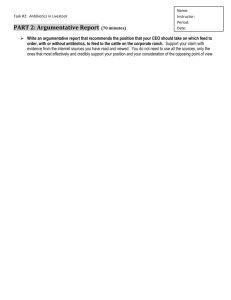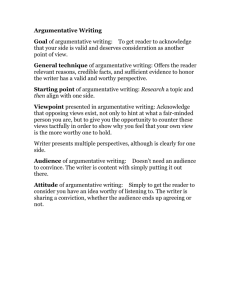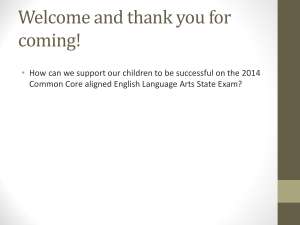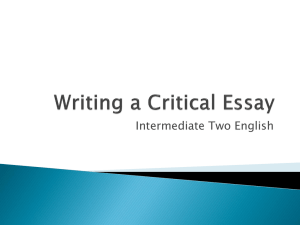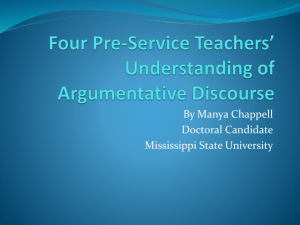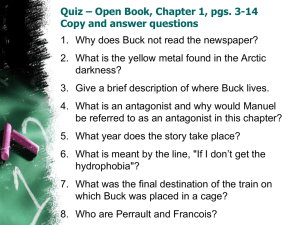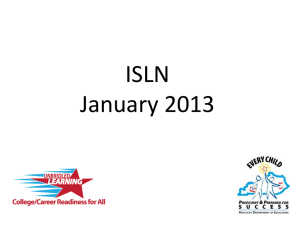FSA
advertisement
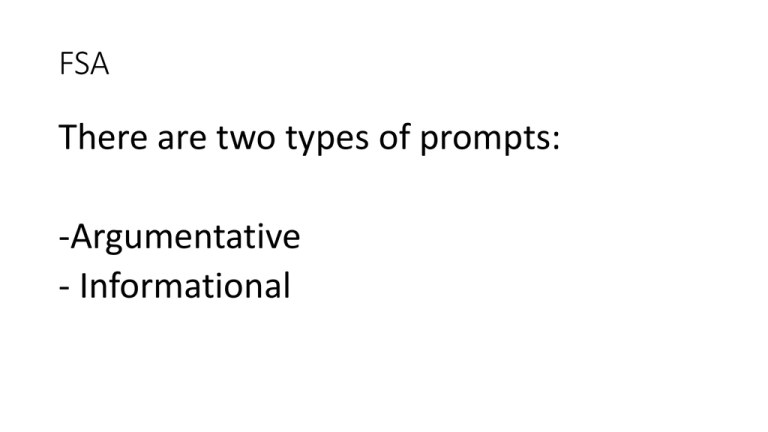
FSA There are two types of prompts: -Argumentative - Informational What’s the difference? •Argumentative: You have a claim and have to prove your point by choosing a side •Informational: You have a controlling idea and they give you what you are writing about Examples of Informational Prompts • Write an informational essay to explain how automotive transportation will change in the coming years. Your ideas must be based on ideas, concepts, and information from the passage set. • How would I write my main point? IT’S GIVEN TO YOU. C: Automotive transportation will change in the coming years. Argumentative Prompt Examples • Write an argumentative essay stating why you agree or disagree with people who demand rescue services when they put themselves at risk. Use information in the passage set to support your claim. In an argumentative you have to pick a side without using 1st or 2nd person. C: People who demand rescue services put themselves at risk. OR C:People who demand rescue services do not put themselves at risk Argumentative Prompt Examples •Write an argumentative essay stating why you agree or disagree with the idea that animals can learn and use language. Use information in the passage set to support your claim. Write one claim agreeing and one claim disagree Identify what the task is. Is this an argumentative or informational prompt. What is it asking you to do? Explain how advancements in 3-D technology can benefit society. Your ideas must be based on ideas, concepts, and information from the passage set. Answer: •Informational. You are explaining how advancements in 3-D technology can benefit society. It is given to you what you need to write about. Identify what the task is. Is this an argumentative or informational prompt. What is it asking you to do? • Write an essay stating why you agree or disagree with the idea that individuals should be prosecuted for statements made on social media. Answer • Argumentative, because you have to pick a point and prove it. (either agreeing or disagreeing with the idea that individuals should be prosecuted for statements made on social media) What does in your intro? What goes in the Intro? • The first sentence should be your claim or controlling idea (your main point). • The rest can be a summary of what each source was about. • Remember not to include your reasons in your intro. You are explaining in your body. What does in your body paragraphs ? Body Paragraphs • There should be 2-3 body paragraphs • If you can’t come up with a third body paragraph don’t do one! • You should have direct quotes AND paraphrasing that are CITED. • Elaboration: defining, explaining, comparing, analyzing • Transitions • A point in each paragraph What goes in your conclusion? Conclusion •Restate your claim or controlling idea in a different way. •Talk about your main points •Why are your points important? Citations- Give credit! Paraphrasing: Stating something that was written in the text in YOUR OWN words. Direct quote: Taking the information from the text directly (word-from-word) Citing •Paraphrase this statement Source 2, paragraph 3 The titanic was originally designed to carry 32 lifeboats, but the number was decreased because the designers felt that the deck would be too cluttered. Possible answer •The titanic was suppose to have over 30 lifeboats; however, they were not added due to space issues (Source 2, Paragraph 3). Cite this as a Direct Quote Source 3, paragraph 3 The captain wanted to prove that the Titanic could cross the Atlantic in six days. Possible Answer •In source 3, paragraph 3, the author states, “The captain wanted to prove that the Titanic could cross the Atlantic in six days.” Don’t… • DON’T use first or second person point of view (example: I, we, us, you, your, I’m, our…) • DON’T use slang • DON’T forget to indent • DON’T forget to capitalize and use punctuation Practice: Rewrite Claims without Using “I or you” •I agree that students should not have homework. •I think that animals can communicate and use language. •You should not get grades in school Possible answers •Students should not have homework. •Animals can communicate and use language •Students should not have grades.
